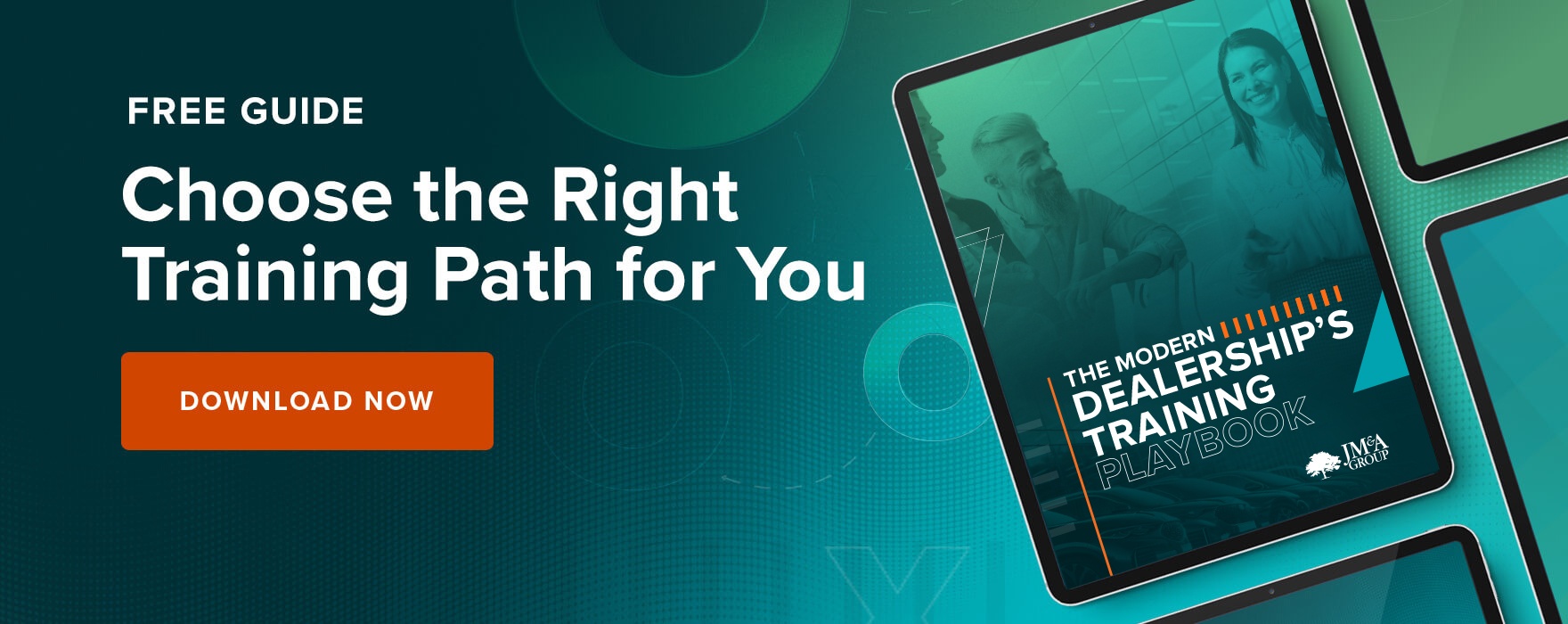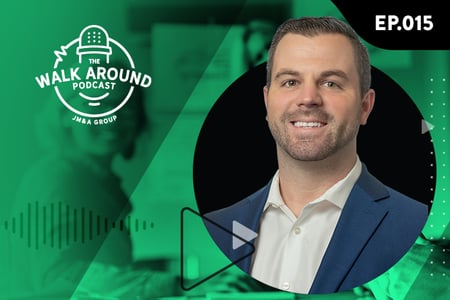Dealership Training Programs: Driving Performance & Profitability
A comprehensive overview of dealership training programs for individuals and teams, plus how to begin training.
As car dealerships strive to stay ahead of the changing landscape of auto retail, dealership training programs have become an essential component to enhancing dealership performance, boosting profits, and increasing customer satisfaction.
In this blog post, we'll discuss the value of dealership training programs and what dealerships need to do to ensure their training efforts are successful. We'll guide you through the steps, providing you with the tools and knowledge needed to transform your dealership into a high-performing powerhouse that thrives in the face of change.
Let's get started:
Designing and Delivering Customized Training Programs
One size does not fit all when it comes to dealership training programs.
Every dealership has unique challenges, strengths, and opportunities for growth. That's why customized training programs and post-class re-enforcement are essential to address the specific needs and goals of each dealership.
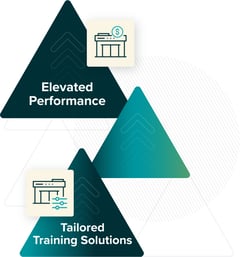
By investing in tailored training solutions designed using adult learning theory and proven learning science principles, you can empower your team with the skills and knowledge they need to thrive in their roles and contribute to your dealership's success.
Comprehensive Training for Career and Business Growth
Comprehensive dealership training programs should cover a wide range of topics, from sales and customer service to management and leadership. The training curriculum should be designed based on the dealership's priorities, objectives, and culture. For instance, a dealership with low customer satisfaction scores may prioritize training in customer service skills. Meanwhile, a dealership with a high turnover rate may need management and leadership training to foster a positive work culture and retain talent.
Flexible Learning Solutions
To ensure that training courses cater to different learning preferences and schedules, flexible learning options should be considered.
Effective ways to deliver training include:
On-site coaching: Particularly useful for hands-on learning and observing best practices in action.
Self-paced online courses: Online courses are convenient and can be completed at the learner's own pace.
Hybrid: In-person classroom settings and virtual training workshops both provide interactive and collaborative learning opportunities.
Continuous Training from a Well-rounded Program:
Learning opportunities do not end once training is completed. Dealers can make sure their teams are continuously learning through additional course certificates that fit their training pathways or through regular training that occurs annually or every few years.
In summary: Designing and delivering customized training programs requires a thorough understanding of the dealership's needs, staff, and goals. That's why working with a dealership training expert can be invaluable for assessing the dealership's training needs, designing a tailored curriculum, and delivering effective training programs that improve performance and profitability.
Building High-Performing Teams and Fostering a Culture of Innovation
Dealerships that invest in talent management and leadership development are better equipped to optimize performance in all areas of the dealership. Attracting, retaining, and developing top talent is critical to achieving long-term success and staying ahead of the competition. By focusing on these key areas, you can build a team that thrives in the modern automotive landscape.
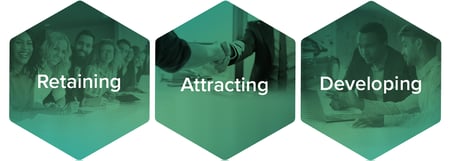
Talent Management and Development Strategies
Offering competitive compensation packages, a positive work environment, and opportunities for professional growth helps you retain your best employees. Regular training and development programs along with recognizing and rewarding good performance helps your team stay up-to-date with industry trends and acquire new skills.
Leadership & Driving Forward-Thinking
As a dealership leader, your ability to inspire, motivate, and guide your employees is crucial to their success. Cultivate a leadership style that encourages open communication, maximizes your employees core strengths and fosters a supportive work environment. By doing so, you'll create an atmosphere where collaboration can thrive long-term.
In summary: Your employees are your greatest asset and the drivers of your business. By embracing these strategies you can build a high-performing team that drives performance, profitability, and customer satisfaction for years to come.
Creating a solid dealership culture is not an event, it’s a daily, intentional effort that requires a lot of hard work and a big investment. People are not only the dealership’s biggest expense, they are the biggest opportunity to help drive performance.

Kevin Hull
Director of Strategic Planning
JM&A Group
Training: A Value Add for Leaders and Individuals
Implementing opportunities for team training is a great way to create cohesive growth and development plans across your team. But what type of training is available for individuals and leaders to participate in?
Individual training provides your associate with education to advance within their career or the chance to move into a new role. Dealer leaders – with the help of an experienced training provider – can find leadership training courses that can uplift members of their staff.
A study found that 36% of dealerships offer scheduling flexibility for part-time employees, while 41% offer career path opportunities. For today’s employees, pay is no longer the top motivator for recruitment or retention. Offering training programs to address this priority shift and invest in their career growth is one way to acknowledge and support your employee's personal goals.

Source: Hireology
Team members that are well-trained and aware of modern practices are not only more likely to stay, they are also a source of innovation and profitability at your dealership.
In summary: Training programs can take many forms, but the best training is aligned to your dealership’s needs – whether that is in group training or training individuals to advance their career journeys. Managers can also seek developmental opportunities in a leadership training course tailored to their needs as an executive.
Key Factors of a Comprehensive Dealership Training Program
The key to boosting dealership performance and profitability lies in developing a comprehensive training program that addresses the unique needs of each department role within the organization and has the flexibility to meet dealership needs.
By focusing on the growth of every team member, from sales staff to finance managers, you'll create an environment where each person can contribute their unique skills and talents to the overall success of the dealership.
The Foundation of Car Dealership Training
Car dealership training typically falls into two categories, new hire training and ongoing development of existing staff. Successfully executing on both can create an environment of staff engagement:
New hire training programs explain a dealership's core products, processes, and technologies, benefiting employees by:
- Building a strong foundation in automotive sales and F&I products
- Providing an overview of basic product and service knowledge
- Detailing the sales process, compliance, and key product life cycles
- Outlining learning objectives for the first year
- Providing one-on-one coaching for sales and development goal achievement
Ongoing training and development reinforces professional growth and continuously elevates sales, service and F&I employee knowledge including:
- Enhanced mastery of automotive sales techniques and products
- Deep understanding of complex offerings and business profitability
- Compliance adherence to industry standards as regulations change
- Upskilling opportunities across departments
- Improving sales and communication skills in-store and online
Enhancing F&I Processes to Sustain and Increase Sales
A successful dealership relies on a strong Finance and Insurance (F&I) department to drive sales, grow profitability, enhance customer experiences and remain in compliance with dealership laws and regulations. Providing targeted, continuous training to finance managers can increase key F&I performance metrics. In fact, JM&A Group’s Consulting Solutions shares that a finance manager’s average PVR increase post-training is $169.
When looking to enhance your F&I performance, here are some key areas to focus on:
Leveraging Technology in Automotive Training
Modern dealership training programs leverage technology in order to provide the best learning experience for students. Embracing new learning tools and platforms can help dealerships offer tailored training experiences that are flexible, engaging, and effective for everyone.
This approach provides learning based on results and allows team members to acquire new skills quickly, enabling them to stay up to date with modern advances in the automotive industry.
Partnering with Experienced Training Providers
Partnering with external providers that specialize in automotive training is a crucial element in building a robust dealership training program. Dealer-specific providers, like JM&A Group, offer valuable resources, industry expertise, and an outside perspective to help identify areas of improvement and implement effective training solutions in these key areas:
- Car sales and service
- Leadership and management skills
- Finance manager training
- Compliance certification
- Hands-on coaching and mentoring
- Team building
Customer Interviews and Needs Assessment
Customer interviews are an essential part of the F&I process and a staple in an effective
F&I training program. The best sales training techniques include the psychology of selling: teaching F&I managers to ask the right questions, listen actively and build trust with customers. Creating confidence and showcasing empathy during these interviews can significantly improve the customer experience and lead to higher sales conversion rates.
F&I Menu Presentation Techniques
An effective F&I menu presentation is crucial in showcasing the various financing and insurance options available to your customers. By learning advanced F&I menu presentation techniques and how to present products in an engaging and transparent way, your F&I manager can help your customers make informed decisions as more buyers select F&I products with their purchases.
Comprehensive Product Knowledge
F&I managers who are well-versed in the features, benefits and pricing of the products they offer can more effectively communicate the product’s value to customers. This vital knowledge then translates into increased sales of add-on products, such as vehicle finance and lease protection products, service contracts, GAP coverage, and maintenance needs and programs.
Legal and Compliance Aspects of Selling and Financing
Understanding the laws and regulations dealerships must comply with is of the utmost importance to your dealership. Detailed courses on top liabilities surrounding sexual harassment, discrimination, Fair Credit/Fair Pricing (VPP) and more, are beneficial to protect your staff, customers, data, reputation and your bottom line. By investing in ongoing training and staying informed about the latest industry regulations and contract elements, you can help ensure that your F&I department operates within the bounds of the law.
F&I managers must be up to date on legal and compliance requirements to avoid the possible risks that can result in significant fines, penalties and reputational damage.
Building Strong Relationships with Lenders
Establishing strong relationships with a diverse range of lenders can help your dealership secure more competitive financing options for your customers. By working closely with your lending partners, you can better understand their requirements, streamline the loan application process, and ultimately, provide a smoother and more satisfying F&I experience for your customers.
Overall, a robust F&I training program that covers these critical areas can provide dealerships with a significant advantage in the evolving automotive industry. With the right training, F&I managers can build strong customer relationships, close more deals, and stay ahead of compliance risks, leading to increased sales and sustained growth for your dealership.
Streamlining Sales Processes and Building Trust
One of the key areas where auto dealership training programs can make a significant impact is in the sales process. A comprehensive training program will strengthen your sales team through process alignment and efficiency by focusing on important steps in the buyer’s journey. Here's how you can optimize your sales strategies and foster strong customer relationships focused on trust and transparency:
JM&A GROUP TIP
Beyond the interpersonal, dealerships can create a better experience for consumers and open the door for an upsell by:
- Streamlining sales processes
- Building trust through product knowledge and customer service
- Putting customers’ needs first
Communication and Rapport-Building Skills
Communication is the foundation of any successful sales interaction. To communicate more effectively with customers involves active listening, asking the right questions, and clearly explaining the features and benefits of your products. By developing strong communication skills within your sales team, you can ensure that your customers feel heard, understood and valued.
Effective Meet-and-Greet Techniques
The meet and greet sets the tone for the entire sales process. A warm and welcoming initial interaction can create a positive first impression that puts your customers at ease. Training programs should focus on teaching car salespeople how to evoke this atmosphere through actions like approaching customers with a friendly demeanor, maintaining eye contact and offering a firm handshake.
Identifying and Addressing Customer Needs
Understanding the customer’s needs is critical in assisting them toward the right vehicle, service or financing options. By taking the time to get to know your customers and asking open-ended questions, you can gain valuable insights into their preferences, budget and lifestyle. Armed with this information, you can tailor your sales approach to address their unique needs, making the sales process more efficient and personalized and boosting your sales numbers.
Adapting to the Changing Automotive Landscape
Differing generational preferences can complicate the buyer’s journey. Understanding how Baby Boomers, Generation X, Millennials, and Generation Z all have unique purchasing habits, preferences, and expectations can help your dealership remain adaptable by tailoring the sales process to meet your consumer where they are.
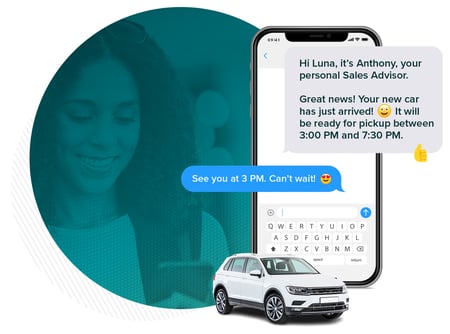
Generation Z, born between 1996 and 2010, love everything digital including social media and text messaging and will prefer a buying process that has some component of technology integrated into it.
Remember, trust and transparency are the pillars of customer service.
In summary: Comprehensive auto dealership training programs can provide salespeople with the tools and skills they need to build trust with customers, the cornerstone of a successful dealership. Streamlining the sales process and enhancing sales skills while understanding customer preferences will ultimately lead to increased customer satisfaction, repeat business, and positive word-of-mouth referrals for your dealership.
Enhancing Service Advisor Skills for Improved Dealership Performance
When it comes to enhancing dealership performance and profitability, service advisors play a crucial role. Service advisor training should cover topics such as process optimization and coaching, profit generation strategies, customer retention techniques, and improving customer satisfaction index (CSI) scores. Here's how you can boost your service advisors' performance.
Six months post-training, a 10-store dealer group’s average cost per repair order (RO) for service increased $50.
Process Optimization and Coaching
To help your service advisors excel in their roles, you must implement a well-defined and sustainable process that outlines each step of the customer interaction, from greeting and vehicle intake to presenting recommendations and closing the sale. Regular professional coaching sessions with your advisors can help reinforce the importance of following these processes and how they align to your unique business goals.
Profit Generation Strategies
Profit generation is a key aspect of a service advisor's role. Train your advisors to upsell and cross-sell additional services by focusing on the value these services bring to the customer. By emphasizing the long-term benefits of routine maintenance, service contracts, and other offerings, your advisors can enhance customer trust, generate additional revenue for your dealership and improve metrics like effective labor rate (ELR) in your service department.
JM&A GROUP TIP
Whether you’re just breaking into the auto retail market or looking to broaden your industry knowledge, JM&A Group’s extensive catalog of training courses can help any salesperson, F&I manager or Fixed Operations specialist excel.
Customer Retention Techniques
Service advisors who build strong relationships with customers and provide exceptional experiences are more likely to save time in the service lane and secure repeat business. Service advisors can be trained in best practices for customer retention, such as following up with customers after their visits, soliciting feedback, and addressing any concerns promptly.
Improving Customer Satisfaction Index (CSI) Scores
Improving CSI (Customer Satisfaction Index) scores should be a top priority for your dealership. High CSI scores can result in increased referral business, better manufacturer incentives, and overall dealership success. To improve your CSI scores, focus on providing exceptional customer service at every touchpoint and regularly review your processes. Invest in training associates in best practices, such as by actively listening to customer concerns and offering helpful solutions.
In summary: By investing in your service advisors' skills and empowering them with the right tools and processes, you can significantly improve your dealership's performance when dealing with customers, thereby increasing CSI scores and profit-generation goals.
Operational Efficiency & Compliance Management
Dealerships operate in a highly regulated industry, with numerous rules and regulations governing how they do business. Complying with these regulations is not just a legal requirement, it's also essential for protecting the dealership's reputation, avoiding costly fines, and enhancing overall performance.
This type of training should cover all areas of the dealership, including sales, service, and finance. It should also include guidance on how to handle sensitive customer information and how to comply with anti-discrimination laws.
Sales Regulations and Compliance in the Dealership
Sales and compliance training should cover regulations related to advertising, sales practices, and consumer protection. It should also include instruction on compliance requirements for the sale of vehicles, such as disclosing the vehicle's history and providing buyers with accurate information about financing options.
Training and certifications from an experienced provider can help your departments operate transparently and follow all relevant laws and regulations, including the FTC’s Safeguards Rule, Truth in Lending Act, Fair Credit Reporting Act, and Equal Credit Opportunity Act.
Dealership Compliance & Safeguards
Dealerships should also prioritize compliance training in all areas of your operations, including policy requirements, HR laws and other common dealership liabilities like sexual harassment, discriminatory practices and data security. This kind of training can help create a positive work environment by promoting open communication channels, ethical behavior and encouraging employees to report any violations or concerns. It should also help employees understand their rights and responsibilities and provide them with the knowledge they need to avoid violating any regulations.
In summary: With the constant developments in the automotive industry, it's essential to stay up-to-date with new rules and regulations. Customized training courses and certifications can be the tool your dealership needs to adapt to necessary changes and ensure compliance long-term.
What Does an Effective Learning Path Look Like?
Below, we’ve outlined an example of a successful dealership learning path for an F&I manager. This learning journey typically involves a mix of in-person or virtual training, hands-on experience, and on-site coaching, which work together to help the individual develop the necessary skills and expertise over time. A comprehensive F&I manager training program also covers a range of important topics that include:
- Foundational training on F&I processes, products, and regulations
- Practical experience with customer interactions and working with lenders
- Mentorship from experienced F&I professionals
- Advanced training in compliance, sales techniques, and relationship management
- Ongoing professional development to stay current with industry changes
- Incorporating a mix of training and real-life experience ensures that your F&I manager develops a deep understanding of their role and can contribute to the dealership's success both in the short-term and long-term
A typical learning path for an F&I Manager should look something like this:
Effective training programs are a vital component of achieving sustainable, long-term success in the automotive industry. By prioritizing continuous learning and development and creating tailored learning paths for key roles, you can ensure that your dealership stays competitive and continues to grow, even in the face of change.
Achieving Sustainable, Long-Term Success through Effective Training Programs
While comprehensive training programs can certainly help dealerships meet short-term revenue goals, the real value lies in their ability to drive persistent growth and sustainability. By investing in your team's skills and knowledge, you are creating a foundation for future success that can be built upon year after year.
The best way to achieve long-term success through training is to make it part of your culture. Regularly assessing and addressing skill gaps, providing ongoing training and coaching, and offering opportunities for professional growth and development can all help keep your team engaged and motivated. This ultimately translates into more knowledgeable staff members who are better equipped to serve your customers and drive sales.
In Closing
In the evolving auto retail industry, comprehensive dealership training programs are essential for dealerships and aspiring professionals to thrive. By investing in automotive training that covers all aspects of dealership management, such as finance manager training, service advisor training, and car sales training, dealerships can transform into profit-generating powerhouses.
Embracing continuous learning and development, customizing training programs, and adapting to the changing automotive landscape are all critical components of a successful dealership training strategy.
By partnering with an experienced dealership training provider, dealerships can access the resources and expertise needed to drive performance, exceed customer expectations and grow profitability.





